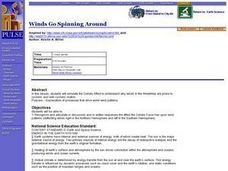National Energy Education Development Project
Introduction to Wind Energy
The U.S. produced enough wind energy in 2015 to power all of the homes in Alaska, California, Delaware, the District of Columbia, Hawaii, Idaho, Maine, Montana, Nebraska, New Hampshire, North Dakota, Rhode Island, South Dakota, and...
PBS
Regional Patterns of Climate: Pacific Northwest
Climate systems involve sunlight, ocean, atmosphere, ice, land forms, and many other factors. Scholars explore each of these variables related to the Pacific Northwest rain forest. They use an online interactive to investigate the polar...
Curated OER
Global Wind Patterns Notes
In this global wind patterns worksheet, students take notes on the wind patters in the southern and northern hemispheres. They indicate the latitude the winds occur at, the pressure, the characteristics and the direction the wind moves....
Curated OER
Forecasting
Students research how to forecast the weather by observing cloud formations and wind patterns. They research modern means of weather forecasting, complete a quiz and an activity page designed to let them try out new forecasting skills...
Curated OER
The Pacific and El Niño
El Nino, and the climate changes that go along with it, are the focus of this Earth Science instructional activity. Learners pay particular attention to the wind patterns that are established on Earth, and look at weather maps to see how...
Curated OER
Environment: Wild Wind Direction
Students examine the different types of wind patterns. Using common materials, they construct weather vanes to measure and record wind direction over a two-week period. After analyzing the data, they draw conclusions about the...
Curated OER
Wind Circulation, Surface Currents and Climate
Pupils describe connections between wind patterns, surface currents, and ocean climate zones. In small groups, they color the ocean climate zones in four different shades of blue. Students then answer questions like what four currents...
Curated OER
Winds Go Spinning Around
Young scholars simulate the Coriolis Effect to comprehend why winds in the Westerlies are prone to cyclonic and anti-cyclonic motion. They arrive at an explanation of processes that drive world wind patterns
NASA
Exploring Data
Bring the sun to your class! Young scholars analyze actual solar wind data in the second instructional activity of a five-part series. Their analysis includes speed, temperature, and density data.
Curated OER
Measuring the Wind in the School Yard
In this wind learning exercise, learners construct a wind speed and direction indicator. They calibrate it using a Beaufort wind scale and take at least five observations/measurements in the school yard. They answer questions about their...
Curated OER
Hurricane Paths: Comparing Places with Different Prevailing Winds
In this wind learning exercise students study a wind rose and graphs for Boston and answer several short answers on prevailing winds.
Curated OER
Neither Wind Nor Rain
Here is another in the interesting series of lessons that use the special State Quarters as a learning tool. This one uses the North Dakota State Quarter. During this lesson, your class learns about the different patterns of erosion, and...
Curated OER
As the World Turns: The Coriolis Effect: Global Wind Patterns, Earth's Rotation
Students use pencil and paper to explore the Coriolis effect and how the Earth's rotation causes global wind patterns.
Discover Earth
Weather Stations
Transform your classroom into a fully functioning weather station with this series of hands-on investigations. Covering the topics of temperature, precipitation, wind patterns, and cloud formation, these activities engage young...
PBS
Mountain Weather: Orographic Lift
Why do so many mountain ranges exist next to a desert? As part of a larger series, PBS 6-8 Weather and Climate answers this question. The presentation offers diagrams and photographs of the development of a rain shadow. From Oregon to...
Curated OER
Harnessing Wind
Students explore the ways that engineers study and harness the wind. They study the different kinds of winds and how to measure wind direction. In addition, students learn how air pressure creates winds and how engineers build and test...
Curated OER
Who Has Seen the Wind?
Students investigate the characteristics of wind. In this weather lesson, students use poetry and van Gogh's paintings to discuss the movement of wind. Students are introduced to the Beaufort Scale and use the tool to measure the wind...
Curated OER
Finding Wind Direction
Students identify the wind direction. For this weather lesson, students use a weather vane to find the wind direction. Students complete a worksheet.
American Museum of Natural History
Make Your Own Weather Station
Scholars build a weather station equipped with a wind vane, rain gauge, and barometer. Following an informative page about the weather, learners follow steps to build their pieces then turn into meteorologists to chart the weather they...
Curated OER
Formation of Wind
Students correctly sequence the steps leading to the formation of wind, and describe the cause and effect relationships involved in the formation of wind. This task assesses students' abilities to classify, generalize, infer, interpret...
Curated OER
Forces That Shape the Earth: Wind, Water and Erosion
For this forces of nature worksheet, students read a 2 page article on the forces of nature and answer 4 detailed comprehension questions about the forces of nature on Earth.
Port Jefferson School District
Climate Patterns
Young climatologists explore the factors that contribute to a region's climate in this two-part earth science activity. To begin, learners are provided with a map of an imaginary planet and are asked to label global wind and ocean...
Curated OER
Global Winds
Students extend their understanding of convection to consider global winds and the effect of the earth's rotation on the creation of patterns of prevailing wind direction.
Centers for Ocean Sciences
Ocean and Great Lakes Literacy: Principle 1
Is your current lesson plan for salt and freshwater literacy leaving you high and dry? If so, dive into part one of a seven-part series that explores the physical features of Earth's salt and freshwater sources. Junior hydrologists...
Other popular searches
- Global Wind Patterns
- Earths Wind Patterns
- Wind Patterns and Weather
- Pressure Wind Patterns
- Prevailing Wind Patterns
- Global Wind Patterns Notes
- Wind Patterns Ocean
- World Wind Patterns

























